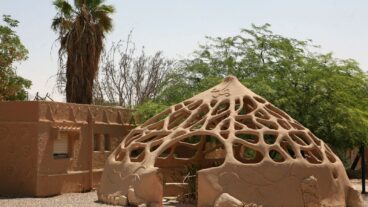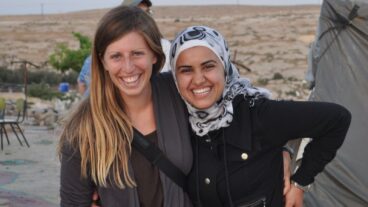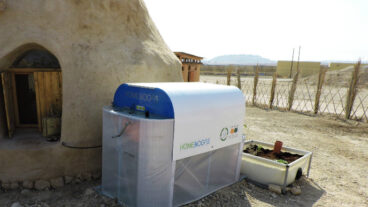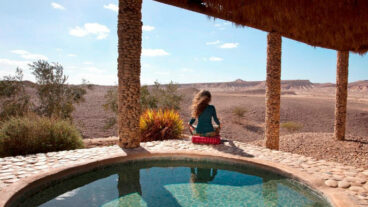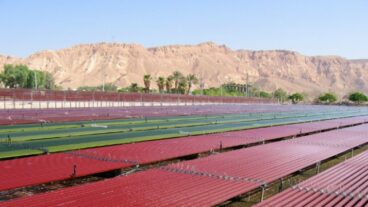A new demo village in southern Israel’s Arava Desert showcases cutting-edge Israeli solutions for housing, energy, water and agriculture needs of populations out of reach of national water and energy grids in any part of the world.
The village, built in the environmentally forward Kibbutz Ketura ahead of last December’s sixth annual Eilat-Eilot Green Energy Conference, is a central feature of the Eilat-Eilot Off-Grid Hub, a project of the nonprofit Eilat-Eilot Renewable Energy Initiative.
The village has three solar-powered model structures constructed by volunteers from Kibbutz Lotan’s Eco-Building Program – a thatch-roofed communal building with simple yet innovative sources of natural light and ventilation; a straw-and-wool insulated plywood house roofed with palm leaves (for ventilation) and metal (for protection from the elements); and a dome-shaped, thermally balanced “Earth Bag” house made with sacks of local soil.
These structures spark creative thinking about inexpensive, sustainable green building, says Tomer Weinstein, manager of the Eilat-Eilot Off-Grid Hub.
The first four Israeli startups demonstrating their products in the village are HomeBioGas (backyard biodigesters that convert organic waste into clean biogas for cooking, heating and lighting, as well as organic liquid crop fertilizer), Kalisaya (portable solar energy generator), Ulysses (remote, real-time monitor for production and consumption of energy and water) and SunDWater (solar-powered water-purification system for drinking and agriculture).
These and other clean-tech companies involved in the hub can further develop their products with the assistance of world-renowned researchers from the Kibbutz Ketura-based Arava Institute for Environmental Studies, and receive help with business and marketing strategies to reach the attention of Eilat-Eilot’s network of affiliates in countries that most need these technologies.
The Israeli model can be replicated
In the vast Eilat-Eilot region of sprawling desert landscapes, the only natural resources are abundant sunlight and open spaces. Capitalizing on these advantages, the Eilat-Eilot Renewable Energy Initiative is transforming the region into an international center for research and development of technologies for renewable energy.
The initiative now brings about 104 megawatts of solar- and biogas-generated electricity to the area’s power grid – making the southern Arava one of the only places in the world that produces the majority of its own electricity during the day. By 2040, Eilat-Eilot could be entirely energy-independent and free of fossil-fuel and carbon emissions.
We use renewable energy, specifically solar, to leverage the whole region and produce more jobs along with electricity to become more self-sustainable,” Weinstein tells ISRAEL21c.
“This is a model proven to work in Israel, and we want to look at rural regions throughout emerging markets and see what we can do to chip in and be a part of this worldwide phenomenon. Globally, there is a growing understanding of the potential of rural technology and business models that aim for the bottom of the pyramid.”
In partnership with the Capital Nature renewable-energy investment firm, the Off-Grid Hub is working with a variety of stakeholders focused on electrifying rural African villages, including the UN’s IRENA (International Renewable Energy Agency), community-based NGOs, local and national governments and the World Bank.
“We’re combining know-how in terms of cutting-edge technologies in solar, water and agriculture with private-sector and new business models,” says Weinstein, who lived in Kenyan slums for two years as a social entrepreneur and has a master’s of business administration in development work from the University of Geneva.

“We’re also promoting the companies through worldwide conferences,” he says. “For instance, last month I presented the hub and the companies at an alternative-energy conference in Dakar, Senegal. This November we’ll have a conference on business models for the bottom of the pyramid for renewable energy companies. It will be hosted at Eilat-Eilot’s new renewable energy structure near Yotvata.”
US Ambassador Daniel Shapiro recently toured the village and all the hub’s facilities with Eilat-Eilot Renewable Energy Initiative founder and CEO Dorit Banet, after the organization won a $61,000 grant from Middle East Partnership Initiative (MEPI) of the US State Department. MEPI supports efforts to promote political, economic and social reform in the Middle East and North Africa.
“Many Middle Eastern countries are not connected to the power grid,” Banet tells ISRAEL21c. “Ambassador Shapiro came to see what we’re doing and give the official certification for the grant. We showed him our power station, our solar fields and our off-grid village, as well as our new research and innovation hub near Yotvata.”
The Eilat-Eilot Renewable Energy Initiative, supported by organizations such as the UJA Federation of Greater Toronto, the Jewish National Fund and the Jewish Agency, also sponsors an educational youth science competition and Climate Launchpad, Europe’s largest clean-tech business idea competition.
For tourists, five observation points and a renewable-energy visitors center are planned for the Arava region. To find out about current tour options in English, contact tours@eilateilot.org.










